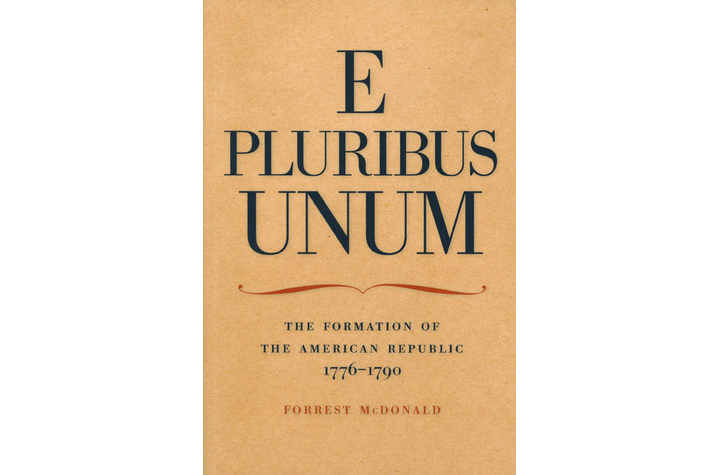Recapturing a Revolution

It’s hard to find a history of the American Revolution from academia that actually tries to recapture it rather than engage in a deconstruction project. Fortunately, the Liberty Fund has re-issued a classic that tries to reconstruct America’s founding, and largely succeeds.
“That the American Revolution and the American people—of all the world’s peoples the most materialistic and most vulgar and least disciplined—should have produced a governmental system adequate to check the very forces they unleashed; this was the miracle of the age, and of the succeeding age, and of all ages to come,” Forrest McDonald wrote in E Pluribus Unum: The Formation of The American Republic 1776-1790. “The French, the Russians, the Italians, the Germans, all the planet’s peoples in their turn, would become so unrestrained as to lost contact with sanity.”
“The Americans might have suffered a similar history, had they followed the lead of those who, in 1787 and 1788, spoke in the name of the people and of popular ‘rights,’” McDonald concluded. “But there were giants in the earth in those days, and they spoke in the name of the nation, and the people followed them. As a result, the Americans were, despite themselves, doomed forever to be free.”
McDonald is a distinguished University Research Professor Emeritus at the University of Alabama. We should note that he nonetheless avoids hagiography in his account, offering vivid portraits of those “giants” that, nonetheless, note their quirks:
“In an age I which most Americans stood about five feet five and measured nearly three-fourths of that around the waist, Washington stood six feet and had broad, powerful shoulders and slim hips; and he had learned the trick, when men said something beyond his ken, of looking at them in a way that made them feel irreverent or even stupid.”
“Madison, at thirty-seven (or any other age), was Washington’s opposite. Few men looked less like a leader: owned a physical presence as uncommanding as one was likely to meet. But his knowledge of what to do in a convention was vast, and his talents for doing it matched his knowledge.”
McDonald’s character sketches of lesser known delegates to the Constitutional convention are, if anything, even more colorful:
“Attorney General William Patterson was so short that even Madison could see the top of his head without standing on tiptoe, but what he had inside made him a tall man at any gathering.”
“Alexander Martin, a former governor of North Carolina, had lived in luxurious isolation on his back-country plantation for so long that (it was rumored) he (a) had abandoned any nationalist sentiments he had ever held; (b) had taken to writing poetry; and (c) had begun doing things with this slaves that made even rednecks blush. (The first two rumors were warranted; the third was never documented.)”
McDonald’s masterful volume is exhaustively sourced, yet never reads like the original source material. “As it happened, Nature had been as generous in the South as she was parsimonious in New England,” McDonald wrote. “Accordingly, to a Southerner the evidence said that God was a decent, easygoing chap; to the Yankee, is said that God was a harsh, vindictive old man who was always putting people on trial.”



